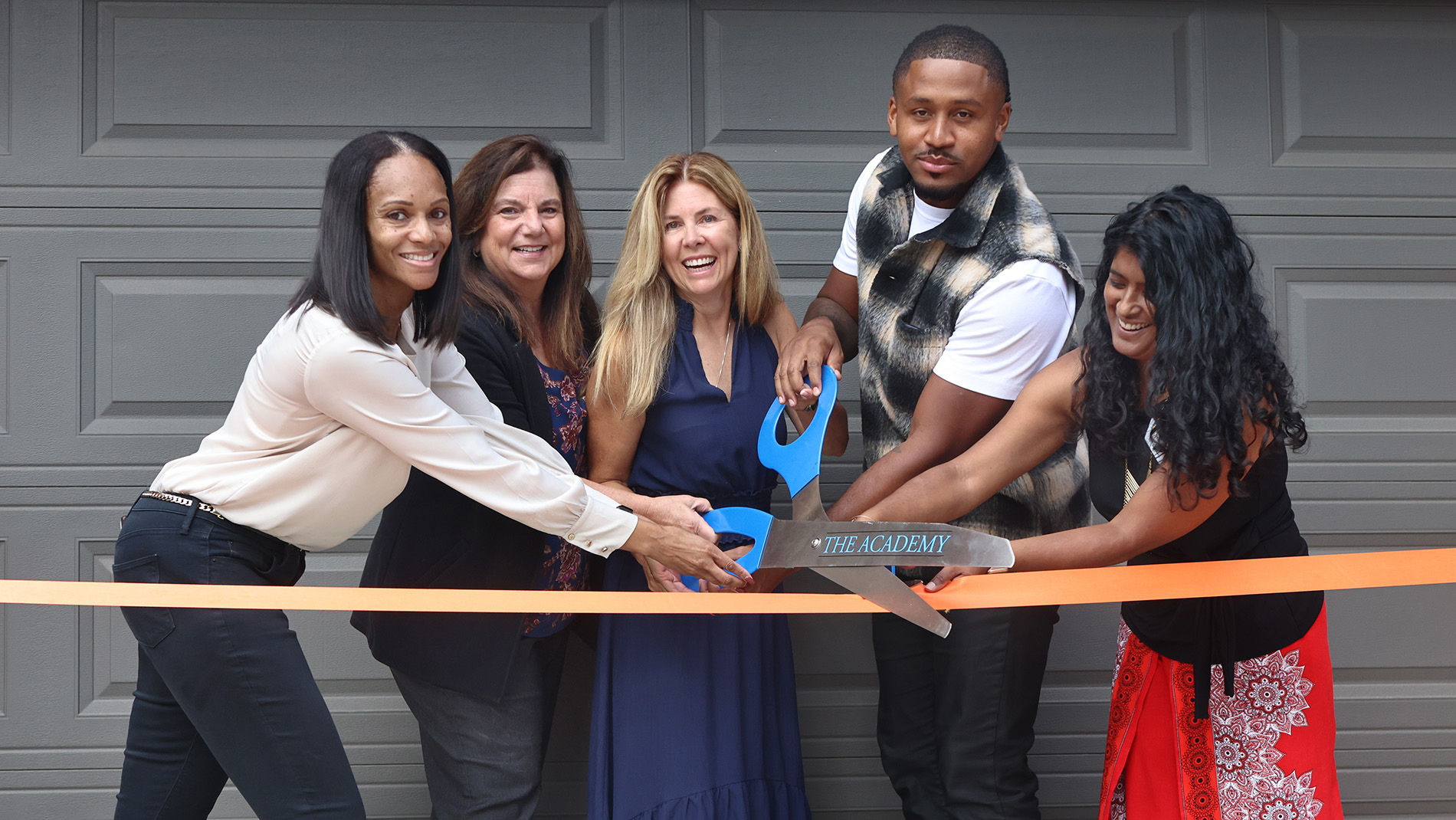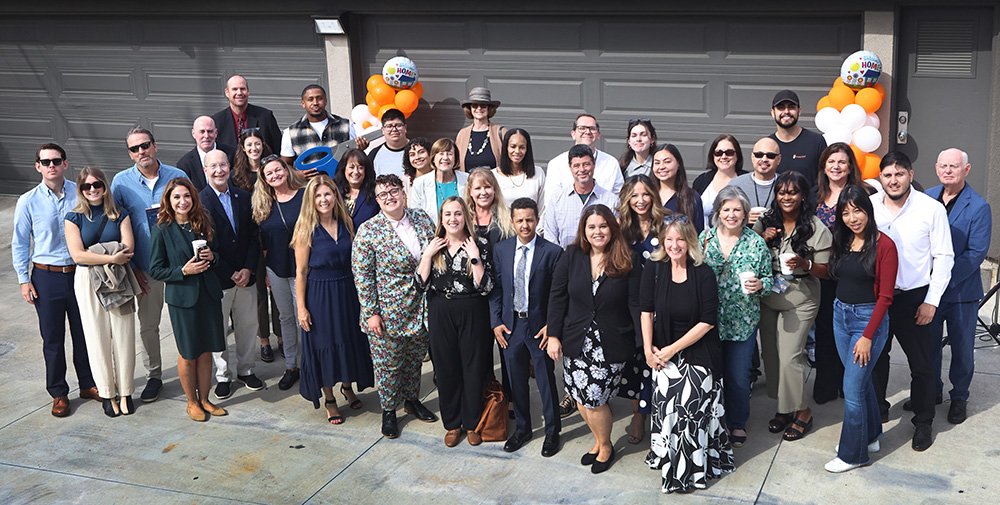
From left: Tiffany Mitchell, Judge Maria Hernandez, Elizabeth Cauffman, Abraham and Rani Mammen cut the ceremonial ribbon at the newly-opened Young Adult Court Recovery-Focused House. Below photos from top: Ben McDonald leads a tour of the house; Hernandez thanks collaborators; Cauffman, Hernandez, Fred Jung and Mitchell; Young Adult Court supporters. Photos by Karen Tapia
New recovery home opens for Young Adult Court participants
When Abraham first appeared before Orange County Superior Court Judge Maria Hernandez in Young Adult Court, he carried serious strikes on his criminal record and an uncertain future. Today, he's felony-free, playing college football, employed and safely housed with his own vehicle.
 As the first successful graduate of the innovative court, Abraham proudly joined the program’s creators and partners Sept. 12 in Fullerton to officially open the first Young Adult Court Recovery-Focused House.
As the first successful graduate of the innovative court, Abraham proudly joined the program’s creators and partners Sept. 12 in Fullerton to officially open the first Young Adult Court Recovery-Focused House.
Abraham's transformation exemplifies what organizers hope the new facility will make possible for more young men facing similar crossroads.
The house, operated by Orangewood Foundation in partnership with UC Irvine and Orange County Superior Court, represents eight years of collaborative effort to address a critical gap in services. With $1.2 million in Proposition 47 funding from the California Board of State and Community Corrections, the facility will house up to six participants over 48 months, providing stability during their recovery journey.
Beyond Walls and Windows
“This is more than just a house with walls and windows,” said Elizabeth Cauffman, UC Irvine professor of psychology and co-creator of Young Adult Court. “This is a house of second chances. This is a house of recovery. This is a house of hope.”
The need is urgent: 66% of California's justice-involved youth struggle with substance use, according to Tiffany Mitchell, chief program officer at Orangewood Foundation. The new facility addresses the challenge through harm reduction techniques, trauma-informed care, and comprehensive support services specifically designed for transitional-age youth.
Science Meets Street Justice
Young Adult Court, launched seven years ago, takes a unique approach to criminal justice for 18-25 year olds facing felony charges. Participants must attend school, maintain employment, find housing, and meet with Judge Hernandez every other week — all while navigating substance use recovery and other personal challenges.
The program's most powerful incentive: successful graduates can have their felony reduced to a misdemeanor or dismissed entirely, clearing their record for life.
While Hernandez acknowledged Orangewood, UC Irvine, a number of community partners and donors, Cauffman thanked the judge.
“This is a judge who uses science to guide her practice,” Cauffman explained. “She holds people accountable but she does it in a fair way, a just way, a way that allows people to turn their lives around.”
Community Investment Pays Off
Philanthropist Gary Fudge, who has supported the program for several years, emphasized the broader community impact.
“Sometimes I sit in the court and see 15 people involved in supporting one youth — they've never had this kind of support team behind them before,” he said.
The collaborative model brings together the Orange County Probation Department, Public Defender's Office, District Attorney's Office and community partners. Preliminary research by Cauffman shows the court is making a measurable difference in participants' lives.
A Ribbon for Hope
As officials cut the ribbon Friday, they weren’t just opening bedrooms and living rooms, Cauffman pointed out, they were opening pathways to transformation for young adults who might otherwise face a lifetime marked by a single mistake.
“Imagine you're 19 and you've done something stupid and it lands you a felony that's on your record for the rest of your life,” Cauffman said. “This court lets that felony get off the record if you do the work.”
The Recovery-Focused House ensures participants have the stable foundation necessary to do that work, breaking cycles of incarceration while building healthier futures — one second chance at a time.
Fullerton Mayor Fred Jung called the new house an opportunity for young men in distress to “rise up on their own.”
— Mimi Ko Cruz

Related
Fullerton Observer: A house of second chances
Orange County Register: Groundbreaking criminal justice starts in Santa Ana courtroom
ABC News: Solutions on Eyewitness News: Young Adult Court
Orange County Register: OC Young Adult Court adds new component to prevent recidivism
Estrella News: Young Adult Court graduation
Daily Pilot: 3 new graduates emerge felony-free from the Orange County Young Adult Court
Telemundo: Young Adult Court's first graduate
Orange County Register: Orange County’s ‘Young Adult Court’ celebrates its first graduate
Young Adult Court provides second chance
Cauffman, Hernandez honored for collaboration
Reimagining the justice system
Young Adult Court graduates 4 more
UCI awarded $10.1 million to expand OC Young Adult Court study
NIJ funds UCI evaluation of new Orange County Jail program
OC Young Adult Court celebrates 4th graduation
Celebrating first graduate of OC Young Adult Court
Features